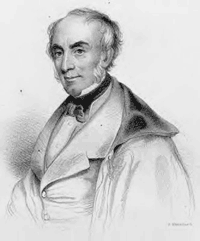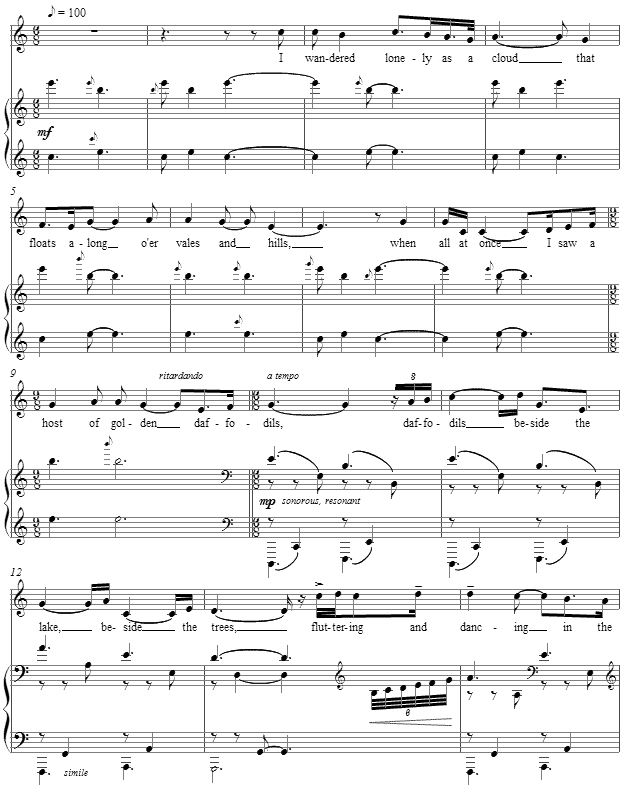Music and Texts of GARY BACHLUND
Vocal Music | Piano | Organ | Chamber Music | Orchestral | Articles and Commentary | Poems and Stories | Miscellany | FAQs
Daffodils - (2006) William Wordsworth
for baritone and piano
for Patrick Delcour
I wander'd lonely as as a cloud
That floats on high o'er vales and hills,
When all at once I saw a crowd,
A host of golden daffodils,
Beside the lake, beneath the trees,
Fluttering and dancing in the breeze.
Continuous as the stars that shine
And twinkle on the Milky Way,
They stretch'd in never-ending line
Along the margin of the bay:
Ten thousand saw I at a glance,
Tossing their heads in sprightly dance.
The waves beside them danced, but they
Outdid the sparkling waves in glee: --
A poet could not but be gay
In such a jocund company!
I gazed, and gazed, but little thought
What wealth the show to me had brought.
For oft, when on my couch I lie
In vacant or in pensive mood,
They flash upon that inward eye
Which is the bliss of solitude;
And then my heart with pleasure fills,
And dances with the daffodils.
[ 5 pages, circa 3' 35" ]
William Wordsworth
William Wordsworth (1770-1850) was a British poet, who spent his life in the Lake District of Northern England. With Samuel Taylor Coleridge the English Romantic movement with their collection Lyrical Ballads in 1798. Wordsworth focused on the nature, children, the poor, common people, and used ordinary words to express his personal feelings. He defined poetry as "the spontaneous overflow of powerful feelings arising from emotion recollected in tranquility," and wrote, "Poetry is the breath and finer spirit of all knowledge; it is the impassioned expression which is in the countenance of all Science." (from Lyrical Ballads, 2nd ed., 1800)
William Wordsworth was born in Cockermouth, Cumberland, in the Lake District. His father was John Wordsworth, Sir James Lowther's attorney - the fifth Baronet Lowther was the most feared and hated aristocrat in all of Cumberland and Westmoreland, "an Intolerable Tyrant over his Tenants and Dependents". However, the magnificent landscape deeply affected Wordsworth's imagination and gave him a love of nature. With the help of his two uncles, Wordsworth entered a local school and continued his studies at Cambridge University. As a writer Wordsworth made his debut in 1787, when he published a sonnet in The European Magazine. In that same year he entered St. John's College, Cambridge, from where he took his B.A. in 1791. During a summer vacation in 1790, Wordsworth went on a walking tour through revolutionary France and Switzerland.
Encouraged by Coleridge and stimulated by the close contact with nature, Wordsworth composed his first masterwork, Lyrical Ballads, which opened with Coleridge's 'Ancient Mariner.' About 1798 he started to write a large and philosophical autobiographical poem, completed in 1805, and published posthumously in 1850 under the title "The Prelude," a long work described the poet's love of nature and his own place in the world order.
The winter 1798-99 Wordsworth spent with his sister and Coleridge in Germany. There he wrote several works, including the enigmatic 'Lucy' poems. After return he moved Dove Cottage, Grasmere. In 1802 married Mary Hutchinson. They cared for Wordsworth's sister Dorothy for the last 20 years of life - she had lost her mind as a result of physical ailments. Almost all Dorothy's memory was destroyed, she sat by the fire, and occasionally recited her brother's verses.
Wordsworth's second collection, Poems, in Two Volumes, appeared in 1807. The frankness of his text, although published in the 1830s and 1840s, was considered indiscreet by later Victorian critics. Wordsworth's path-breaking works were produced between 1797 and 1808. In a letter to Lady Beaumont he said: "Every great and original writer, in proportion as he is great and original, must himself create the taste by which he is to be relished." His poems written during middle and late years did not gain similar critical approval. Wordsworth's Grasmere period ended in 1813 when he moved to Rydal Mount, Ambleside, where he spent the rest of his life. His daughter Catherine and beloved son Thomas had died and his friendship with Coleridge, suffering from addiction, was breaking apart. Coleridge did not visit Grasmere, although he had made a trip to the Lake District.
Wordsworth was appointed official distributor of stamps for Westmoreland. From the age of 50 his creative began to decline, but three female assistants took care of him, and filled his life with admiration. Wordsworth abandoned his radical faith and became a patriotic, conservative public man. In 1843 he succeeded Robert Southgey (1774-1843) as England's poet laureate. Wordsworth died on April 23, 1850. The second generation of Romantics, Byron and Shelley, considered him 'dull.' Later the philosopher Bertrand Russell summed up the poet's career: "In his youth Wordsworth sympathized with the French Revolution, went to France, wrote good poetry, and had a natural daughter. At this period he was called a 'bad' man. Then he became 'good,' abandoned his daughter, adopted correct principles, and wrote bad poetry."
"Daffodils" may be found in numerous sources, this being from The Golden Treasury, 1875, Francis Palgrave, ed. (1824-1897).
The harmonic structure oscillates between chords without fifths and chords without thirds, suggesting the open expanse of the field of which the poet writes, seeing a "host of golden daffodils" in "never-ending line" which, in his vision and words, suggests and reminds of the "bliss of solitude." At measure ten, the repeated gesture of the chord absent its fifth and the open fifth absent its third, which accompanies the first measures of the setting, are developed into the harmonic pattern of the song itself, and the accompaniment at that point is intended to be sonorous and resonant, while quiet and somewhat still.
The cadential polytonal chord suggests a depth of color to the vision which makes it ever more intense as the memory revisits and fleshes it out. Even so, the vocal line remains lyrical, and a notated recitative between musical strophes is meant to echo the "bliss" of such pleasant memories.
Patrick Delcour
While singing the role of König Kandaules in Liège and performing with him in the cast, I met linguist, educator and musician, Patrick Delcour. After a rehearsal and over a glass of Scotch beer at the Point de Vue, he suggested this poem be set for baritone, and I made that so while there living in Belgium.



